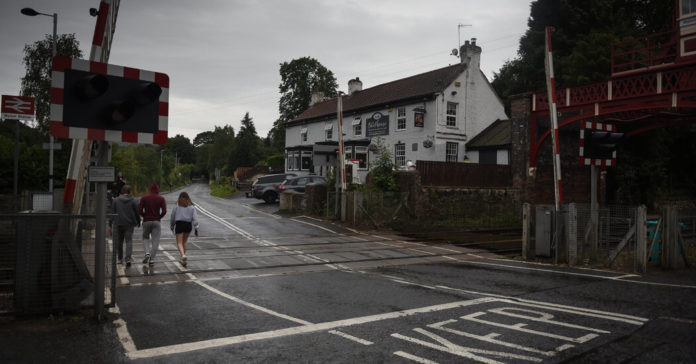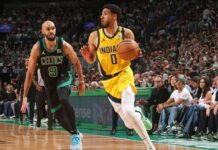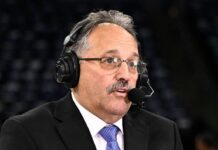NEWCASTLE UPON TYNE, England — A reporter walks into a bar with a hotel booking number in her hand and a mask covering her face.
This is not the start of a joke. It’s how, on Tuesday, I — accidentally — pierced the carefully crafted bubble the European PGA Tour had created to facilitate a six-stop swing in Britain as part of its remade 2020 season.
It was all an honest mistake. It turns out that the European Tour’s health and safety procedures — a testing-heavy regimen described by the former world No. 1 Lee Westwood as “military style, almost” — were nearly sabotaged by a third-party online travel website, which processed my prepaid booking for a two-night stay at the tour’s so-called bubble hotel in northeast England.
The European tour believed it had sealed off the hotel, which is a pitch shot from the Newcastle International Airport and a short drive to Close House golf club, the site of this week’s British Masters. The only guests to be allowed were those associated with the tournament, and only after they had passed a pre-event coronavirus test and submitted to daily temperature checks upon arrival.
Upon learning that I had momentarily breached that circle of trust, a tour official immediately — and urgently — informed me I would have to find a new place to stay. And with its bubble restored, the tour got back to work and began play on Wednesday morning.
As sports leagues and tours groan back into action after a monthslong shutdown prompted by the pandemic, most athletes are getting used to performing in front of few, if any, fans. But that’s not to say they are free from scrutiny. Their personal movements are being meticulously tracked and their health monitored as if they were start-ups about to go public, so great is the fear that careless missteps — a food delivery on a bubble’s fringe, or a quick shopping trip — could foil even the most meticulous restart plan.
“There’s not a moment in the day,” Westwood said, “where it doesn’t feel like your health is being checked or somebody has got an eye on you.”
For the cities and towns the tours visit, everything has changed, too.
This corner of England lavished attention on the British Masters in 2017, the last time Close House played host to the tournament. Nearly 70,000 spectators converged on the course during the week, which culminated in a victory by the Irishman Paul Dunne, who held off a strong field that included Rory McIlroy.
Three years ago, those same crowds had for days spilled into the small village of Wylam, less than two miles away, packing places like the Black Bull pub on Main Street. As the owner Paul Bowes recalled fondly this week, guests stood shoulder to shoulder in his place that week with some of the roughly 2,000 residents.
“And there were more people outside the pub than in it,” Bowes said. “It was fantastic.”
Three years later, it was quiet on the tournament’s opening day, played under a blanket of gray clouds. The village was so unnervingly still, it was as if one could have used the yellow-cased defibrillator mounted on the wall next to the Ship Inn to revive it.
The Black Bull is closed, as it has been since mid-March, the start of the pandemic. The only reason that Bowers and his wife were seated at the bar, he said, was because they were interviewing a new chef to run the kitchen once they do reopen. But, then, there is hardly anyone to serve this week.
Like the rescheduled PGA Tour events in the United States, the British Masters is being held without fans, so there is no spillover into the local streets or businesses.
The seismic waves that emanated from Close House in 2017 rocked the nearby Gosforth Park racecourse, where many of the players mingled with locals during a night of thoroughbred racing. They extended all the way out to the bustling bars and eateries at the Gateshead Quayside along the River Tyne, where Westwood drew a crowd while hitting balls onto a floating island.
Many of those same bars are shut down now, or operating with reduced hours and sheets of paper on which patrons are required to provide their email addresses or telephone numbers, or both, in case they are needed later for contact tracing.
A short distance down the road from the Black Bull, Fox & Hounds was open for lunch service on Wednesday. It was nearly empty around midday when three men on a break from their work as greenskeepers at Close House walked in, ordered pints at the bar and retreated to a back table. There they spent the next half-hour watching live coverage of the tournament’s first round on a cellphone.
They had been at the course since 4:30 a.m., they explained, to finish buffing it for the first round, and would be returning later in the day to prepare it for Thursday’s second day. By lunch, the leaderboard had reflected the European tour’s reach, with players from six countries occupying the top eight spots after the first round.
The Coronavirus Outbreak ›
Frequently Asked Questions
Updated July 23, 2020
-
What is school going to look like in September?
- It is unlikely that many schools will return to a normal schedule this fall, requiring the grind of online learning, makeshift child care and stunted workdays to continue. California’s two largest public school districts — Los Angeles and San Diego — said on July 13, that instruction will be remote-only in the fall, citing concerns that surging coronavirus infections in their areas pose too dire a risk for students and teachers. Together, the two districts enroll some 825,000 students. They are the largest in the country so far to abandon plans for even a partial physical return to classrooms when they reopen in August. For other districts, the solution won’t be an all-or-nothing approach. Many systems, including the nation’s largest, New York City, are devising hybrid plans that involve spending some days in classrooms and other days online. There’s no national policy on this yet, so check with your municipal school system regularly to see what is happening in your community.
-
Is the coronavirus airborne?
- The coronavirus can stay aloft for hours in tiny droplets in stagnant air, infecting people as they inhale, mounting scientific evidence suggests. This risk is highest in crowded indoor spaces with poor ventilation, and may help explain super-spreading events reported in meatpacking plants, churches and restaurants. It’s unclear how often the virus is spread via these tiny droplets, or aerosols, compared with larger droplets that are expelled when a sick person coughs or sneezes, or transmitted through contact with contaminated surfaces, said Linsey Marr, an aerosol expert at Virginia Tech. Aerosols are released even when a person without symptoms exhales, talks or sings, according to Dr. Marr and more than 200 other experts, who have outlined the evidence in an open letter to the World Health Organization.
-
What are the symptoms of coronavirus?
-
What’s the best material for a mask?
-
Does asymptomatic transmission of Covid-19 happen?
- So far, the evidence seems to show it does. A widely cited paper published in April suggests that people are most infectious about two days before the onset of coronavirus symptoms and estimated that 44 percent of new infections were a result of transmission from people who were not yet showing symptoms. Recently, a top expert at the World Health Organization stated that transmission of the coronavirus by people who did not have symptoms was “very rare,” but she later walked back that statement.
The nearby airport is still operating flights from the home countries of at least two of the early leaders, Italy’s Renato Paratore and Portugal’s Pedro Figueiredo. But on the eve of the tournament, the airport had so few travelers in the terminal that one could have swung a golf club for an hour without worrying about hitting a soul.
Andrew Glover, the manager of the DoubleTree by Hilton, the tour’s restricted-access headquarters this week, gazed out a window and noted that the airport parking lot, which was virtually empty three weeks ago, was starting to fill again.
So is his hotel, which only a few weeks ago endured some grim nights when as few as three of his 193 rooms were occupied. In 2017, Glover said, the hotel was a beehive of activity during tournament week, as spectators mingled with tournament officials. This week, it forms the outer periphery of the tour’s bubble.
After he apologized for not being able to accommodate my booking this week, Glover told a story. In 2005, he said, he was working in Britain for another United States-based hotel chain.
In response to an avian influenza outbreak in Asia that year, he said, the hotel chain was required — through guidelines established by the administration of President George W. Bush — to keep a room stocked with pandemic kits at each of its properties. The supplies consisted of thermometers, face coverings, hand sanitizer and gloves.
“I remember thinking it was silly,” Glover said. “I was spending all this money on stuff I was never going to need.” He paused. “If I had had all that equipment three months ago, it would have been tremendously useful.”
But what’s past is past. For Glover, there was no use dwelling on 2005, or even 2017, when the European tour came to town and Newcastle burst at the seams with people and pride.
Three years ago, Bowes said inside the Black Bull, the tournament “definitely put Wylam on the map.” Its return this week has given weary businesses a glimmer of hope that all is not irretrievably lost.
Source : NYtimes













